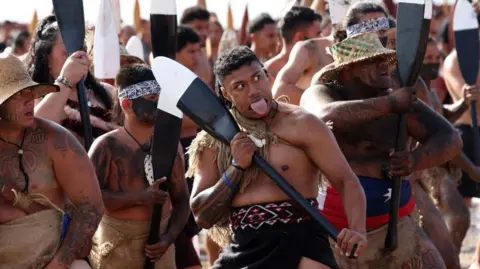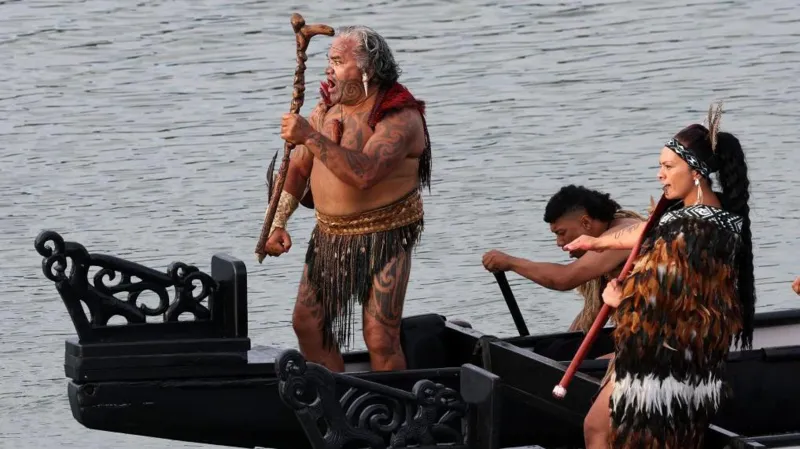Waitangi Day, New Zealand’s national day, is a significant moment of reflection, marking the signing of the Treaty of Waitangi in 1840 between the British Crown and Māori chiefs. However, this year’s observances have been colored by rising tensions and debates over the interpretation of the Treaty and its future in New Zealand’s legal and cultural landscape. Thousands of New Zealanders gathered at the Waitangi Treaty Grounds and across the country to celebrate, but the day also became a platform for passionate protests regarding the perceived erosion of Māori rights.
The Treaty of Waitangi was intended to formalize the relationship between the Crown and Māori tribes, guaranteeing the protection of Māori land rights and ensuring Māori participation in the new colonial governance system. However, the legacy of the Treaty has been marred by misunderstandings, broken promises, and conflicts over its interpretation, particularly between the English and Māori versions. For Māori, the Treaty symbolizes a commitment to safeguarding their lands, culture, and self-determination. Yet, over the past century and a half, successive governments have often failed to honor these promises, leading to systemic inequities in land ownership, economic opportunities, and cultural rights.
The events surrounding Waitangi Day this year have brought these ongoing issues to the forefront, particularly as the government pursues controversial policies that some critics view as detrimental to Māori rights. Prime Minister Christopher Luxon, who attended an event in Akaroa with Ngāi Tahu, New Zealand’s largest iwi (tribe), used the occasion to reflect on the nation’s history. He emphasized the importance of “healing past grievances” and stated that New Zealand’s ongoing ability to move forward and “heal” was something many other nations have not achieved. Nevertheless, his remarks failed to quell the rising discontent among many Māori, particularly in light of the ongoing efforts to reinterpret the Treaty’s principles.
One of the most contentious developments has been the proposed Treaty Principles Bill, introduced by Act Party leader David Seymour. The bill seeks to reinterpret the principles of the Treaty, and while Seymour argues that it is designed to promote equality and ensure all New Zealanders are treated the same under the law, many Māori leaders have decried it as an attack on indigenous rights. Critics believe that the bill downplays the Treaty’s historical context and weakens its commitment to Māori sovereignty, further eroding Māori rights to land, resources, and cultural preservation.

In response to the bill, protests have erupted across the country, with Māori activists and their allies taking to the streets in peaceful marches, known as hikoi. A massive hikoi took place last November, where thousands marched to express their opposition to the proposed legislation and to demand that the government respect the original intentions of the Treaty. The intensity of these protests has only increased in recent months, with the anniversary of the Treaty’s signing intensifying the national debate.
The protests also reflect deeper grievances within Māori communities regarding the erosion of their rights. Methodist leader Te Aroha Rountree spoke at a dawn ceremony in the Bay of Islands, likening the Crown-Māori relationship to a marriage, accusing the Crown of “filing for divorce” while Māori remained unaware of the damage done to their relationship with the state. At a protest in Wellington, Anaru Ryall of the Tiriti Action Group criticized the government for attacking Māori “on all fronts,” pointing to the dismantling of the Māori Health Authority, which had been created to address health disparities between Māori and non-Māori populations.
Luxon’s decision to spend Waitangi Day with Ngāi Tahu, rather than attending events in Waitangi itself, drew mixed reactions. While some praised the Prime Minister for taking the time to reflect with the iwi and acknowledging New Zealand’s shared history, others criticized him for avoiding the tension and controversy associated with Waitangi. Political opponents accused Luxon of cowardice, suggesting that he had chosen to sidestep the difficult conversations taking place at Waitangi. Ngāi Tahu, however, welcomed his presence, describing it as an opportunity to “reflect on our shared history” and strengthen the relationship between Māori and the Crown.

Speaking at Ōnuku Marae, Luxon praised the ongoing efforts of New Zealanders to heal historical grievances. He expressed hope that New Zealand would continue to demonstrate the ability to move forward together, despite the difficult history. He also emphasized that the relationship between Māori and the Crown would continue to be built on mutual respect and collaboration, acknowledging that healing and reconciliation would be ongoing processes.
However, for many Māori, the government’s policies are seen as deepening the wounds of the past. The dissolution of the Māori Health Authority, which was designed to tackle the significant health inequities faced by Māori, has particularly angered many, who argue that it represents a retreat from the government’s commitments to addressing systemic inequality. Additionally, the removal of Māori names from government departments has been seen as an erasure of Māori cultural heritage and an affront to their identity.
The proposed Treaty Principles Bill has sparked a particularly emotional reaction, with many Māori leaders expressing their concerns that the bill will diminish their rights and undermine the Treaty’s promise of partnership between the Crown and Māori. Former justice minister Kiritapu Allan called the bill an “abomination,” describing it as an attempt to “scrub Māori from history” by distorting the Treaty’s meaning and downplaying its importance in New Zealand’s constitutional framework. Māori activists have argued that the bill would further marginalize their communities, exacerbating the social and economic challenges they already face.
However, there are some who support the bill, arguing that it is necessary to update New Zealand’s constitutional framework to reflect a more unified, multicultural society. Economist Ananish Chaudhuri, for instance, has argued that the conversation about the Treaty’s principles is necessary to ensure New Zealand remains a fair and equal society. He believes that enshrining the Treaty’s principles in law would prevent future governments from disregarding Māori rights.
Despite the widespread opposition to the bill, Prime Minister Luxon and his National Party have promised that they will not support the bill at its second reading later this year. While the bill may ultimately fail to pass, the very fact that it has been introduced and discussed publicly has created a fracture in the relationship between Māori and the government. Many Māori see it as a symbol of the government’s unwillingness to fully honor its commitments under the Treaty.
As the debate surrounding the Treaty Principles Bill continues, Waitangi Day has become an important moment to reflect on the state of Māori rights in New Zealand. For many Māori, the signing of the Treaty remains an unfulfilled promise, and the anniversary of that event serves as both a reminder of past injustices and a call to action for the future. The protests, debates, and celebrations of Waitangi Day reflect the deep divisions in New Zealand society, and the struggle for Māori rights remains an ongoing and deeply emotional issue. As New Zealand moves forward, the question remains: can the government truly honor the Treaty and build a future where Māori rights and culture are respected and protected?
Stay ahead with the latest news on global innovation, leadership, entrepreneurship, business, and tech. Join us on WhatsApp or Telegram for real-time updates. Have a report or article? Send it to report@theinnovationtimes.com.
Follow us on X (Twitter), Instagram, LinkedIn, YouTube, Pinterest and Facebook for more insights and trends



